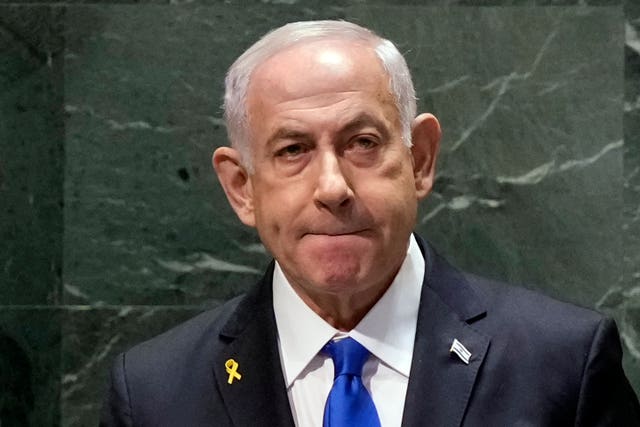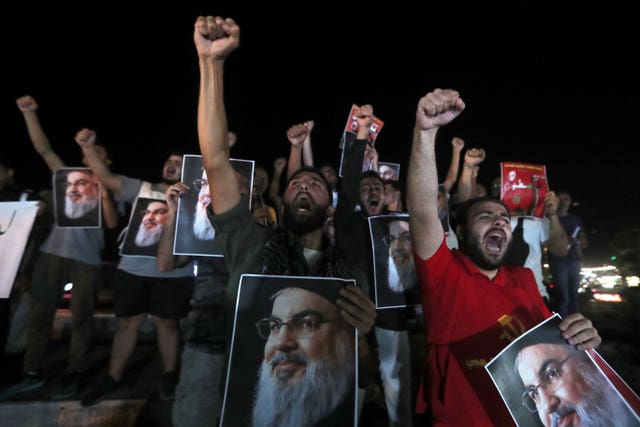The Israeli military has killed another high-ranking Hezbollah official in an air strike.
It said on Sunday that Nabil Kaouk, the deputy head of Hezbollah’s Central Council, was killed in an attack the day before. Hezbollah later confirmed Kaouk’s death.
Several senior Hezbollah commanders have been killed in Israeli strikes in recent weeks, including the group’s overall leader, Hassan Nasrallah, in Beirut on Friday.
Meanwhile, an Israeli air strike on north-east Lebanon killed 11 people on Sunday.
Lebanon’s state news agency said the early morning attack destroyed a home, killing all 11 people inside.
Six of the bodies were recovered from under the rubble and the search continues for the remaining five in the village of al-Ain, the National News Agency said.
More than 700 people have been killed in Lebanon since September 23 when Israel intensified its air strikes around the country, forcing tens of thousands to flee their homes in south Lebanon, the eastern Bekaa Valley and Beirut’s southern suburb known as Dahiyeh.

The number of those displaced has more than doubled and now stands at more than 211,000, according to the United Nations.
Israeli Prime Minister Benjamin Netanyahu said targeting Hezbollah leader Nasrallah was “an essential condition to achieving the goals we set”.
Hezbollah confirmed on Saturday that Nasrallah, one of its founding members who has been linked by Israel to attacks on Israeli and Jewish targets, had been killed in an air strike in southern Beirut.
The Israeli military said it carried out a precise air strike on Friday while Hezbollah leaders were meeting at their headquarters in Dahiyeh.

In his first public remarks since the killing, Mr Netanyahu said: “He wasn’t another terrorist. He was the terrorist.”
He said Nasrallah’s killing would help bring displaced Israelis back to their homes in the north and would pressure Hamas to free Israeli hostages held in Gaza.
But with the threat of retaliation high, he said the coming days will bring “significant challenges” and warned Iran against trying to strike.
“There is no place in Iran or in the Middle East that Israel’s long arm cannot reach,” he said. “Today you know how much that is true.”
Ali Karki, the commander of Hezbollah’s Southern Front, and other commanders were also killed, the Israeli military said.
A statement from Hezbollah said Nasrallah – who led the group for more than three decades – “has joined his fellow martyrs”.
The group vowed to “continue the holy war against the enemy and in support of Palestine”.
In its first statement since the killing of Nasrallah, Lebanon’s military called for calm among the Lebanese “at this dangerous and delicate stage”.
Government officials fear the country’s deep political divisions at a time of war could rekindle sectarian strife and violence.
“The Israeli enemy is working to implement its destructive plans and spread division among the Lebanese,” the military said.
Military vehicles have been deployed in different parts of the capital Beirut as thousands of displaced people continue moving there from the south of the country.
Meanwhile, thousands of people gathered across Iran on Sunday to protest against the killing of Nasrallah.
State TV aired footage of protests in several major cities, while at the parliament, politicians chanted “Death to America” and “Death to Israel”.
Iran helped establish Hezbollah in the 1980s and has provided the Lebanese militant group with sophisticated weaponry and training.
The air strike that killed Nasrallah on Friday also killed Abbas Nilforushan, a senior officer in Iran’s Revolutionary Guard.




Comments: Our rules
We want our comments to be a lively and valuable part of our community - a place where readers can debate and engage with the most important local issues. The ability to comment on our stories is a privilege, not a right, however, and that privilege may be withdrawn if it is abused or misused.
Please report any comments that break our rules.
Read the rules hereLast Updated:
Report this comment Cancel